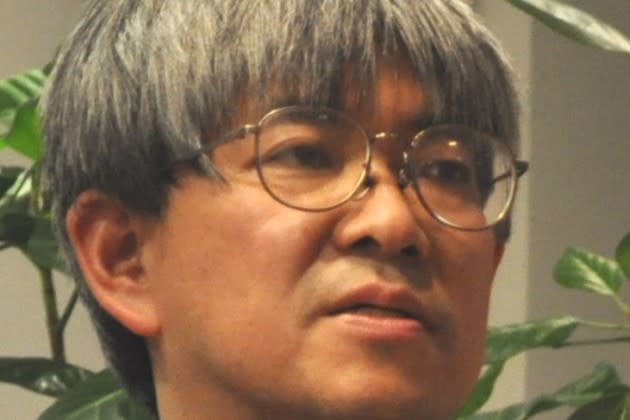Tokyo Festival Is More Diverse and Collaborative, Says Ichiyama Shozo

Ichiyama Shozo returned this year to the Tokyo International Film Festival as its head selector, having for the last twenty years headed the rival Tokyo Filmex event.
COVID last year forced the two festivals to put aside their rivalry and to cooperate in the key autumn slot. Though virus and vaccination conditions in Japan have since improved, allowing the return of in-person festival screenings, the collaboration has been continued.
More from Variety
Ichiyama, however, laughs off suggestions that his shift has made TIFF more like Filmex.
“When TIFF chairman Ando approached me at the beginning of this year with the invitation to become program director of TIFF, I’d already been thinking that it was time for Filmex to change, be renewed. His offer was a good chance to reprogram Filmex under a new director.”
“Kamiya Naoki, had been with me from the beginning of Filmex and totally knew its purpose. He has very good taste. And very good connections with sales agents and producers,” said Ichiyama. After being sure that Kamiya would take over, Ichiyama agreed to the TIFF move. “Naoki’s taste and mine are slightly different. Now he’s freer to choose what he wants.”
During the selection phase, the two events may have been dancing around each other, trying not to overlap, but it happened on occasion.
“I tried to shut out [Kamiya’s opinions]. Sometimes he’d send me an email asking for my advice. I’d usually tell him to go ahead and show the film,” said Ichiyama. “But it did happen that we send invitations to the same title. One film we invited for non-competitive World Focus section and Filmex invited for competition. We left it for the producer to choose.
“At TIFF we prefer to show world premieres, so usually that means that if the film showed in Cannes or Venice, we’d show it in World Focus. Filmex does not require premiere status, so they can take films from [Cannes’] Directors’ Fortnight or Un Certain Regard or from Venice.
While Ichiyama says that both festivals have achieved strong line-ups, he says it was an accident that TIFF ended up with a more Filmex-like, Asian-heavy selection than in previous years.
“I started by thinking about [balancing out] geographies. But once we started watching, we realized there were so many good Asian films which have not been shown at European festivals.
“Venice in particular does not show so many Asian films these days. Instead, they are showing more strong films from Hollywood or Netflix. And, Toronto has reduced the number of films it shows. So, many good Asian films could not get a premiere there. We ended with many Asian films in competition, ten out of fifteen, and no French or Scandinavian films,” said Ichiayma. Fans of European films were able to find plenty in other sections.
Global trends have created another dilemma. While many autumn festivals and awards shows may be trying to position themselves as part of the awards season build-up to the Oscars, there is a surge of interest in Asian TV content sparked by “Squid Game” among other things.
Tokyo has responded by establishing TIFF Series as a platform for TV content. This year it finds house room only for two: “Fragrance of the First Flower,” an LGBT series from Taiwan, and two episodes of “Folklore,” a horror omnibus steered by Singapore’s Eric Khoo. But Ichiyama is confident at the section will be expanded in future editions. “I hope it will become a platform for discovery of Asian series, as that can only be a good thing for the festival,” Ichiyama said.
Nor does he see streaming as an immediate threat to the role of film festivals, despite their huge reach. Amazon Prime Video has 12 million subscribers in Japan, vastly more than the number of tickets TIFF can sell.
“Amazon is one of the big sponsors of the festival this year. They did not submit any films to us, but we are working together on the short film pitching program. We also know that many Japanese directors are shooting films for Amazon. Maybe we can show some next year,” said Ichiyama. “A good film is a good film, even if it is a series.”
The festival has also showed two Netflix films from Venice: “The Power of the Dog” and “The Hand of God” in non-competitive sections.
Earlier this year, TIFF became the first major Asian festival to sign the Collective 50/50 Pledge on gender equality. Achieving that remains a work in progress.
“We have started with jury members and selection committee members and are around equal numbers,” said Ichiyama. Indeed, the competition jury has a female majority.
“I don’t think we should think about gender when selecting films. But I’m sure that we can make a very good selection with many women. We have four [of 15] in competition,” Ichiyama said. But none of those are Japanese.
Instead, the Asian Future has one film by a Japanese woman, and the new Nippon Cinema Now section has two more. Gender parity aside, the indie sections may now be better balanced.
“We felt it strange that strong young Japanese filmmakers were not competing in the Asian Future section. So, we did away with Japanese Cinema Splash section and put some Japanese films into Asian Future,” said Ichiyama.
He says that TIFF still has a need for a panorama of new Japanese filmmaking, hence the creation of the Nippon Cinema Now section. But he also suggests that other festivals, such as Pia and Skip City, which have competition sections for new independent films, have a role to play.
“We will come back and discuss after the festival has finished if we find that young Japanese filmmakers complain that they don’t have enough chance to compete,” Ichiyama said.
Best of Variety
Sign up for Variety’s Newsletter. For the latest news, follow us on Facebook, Twitter, and Instagram.
